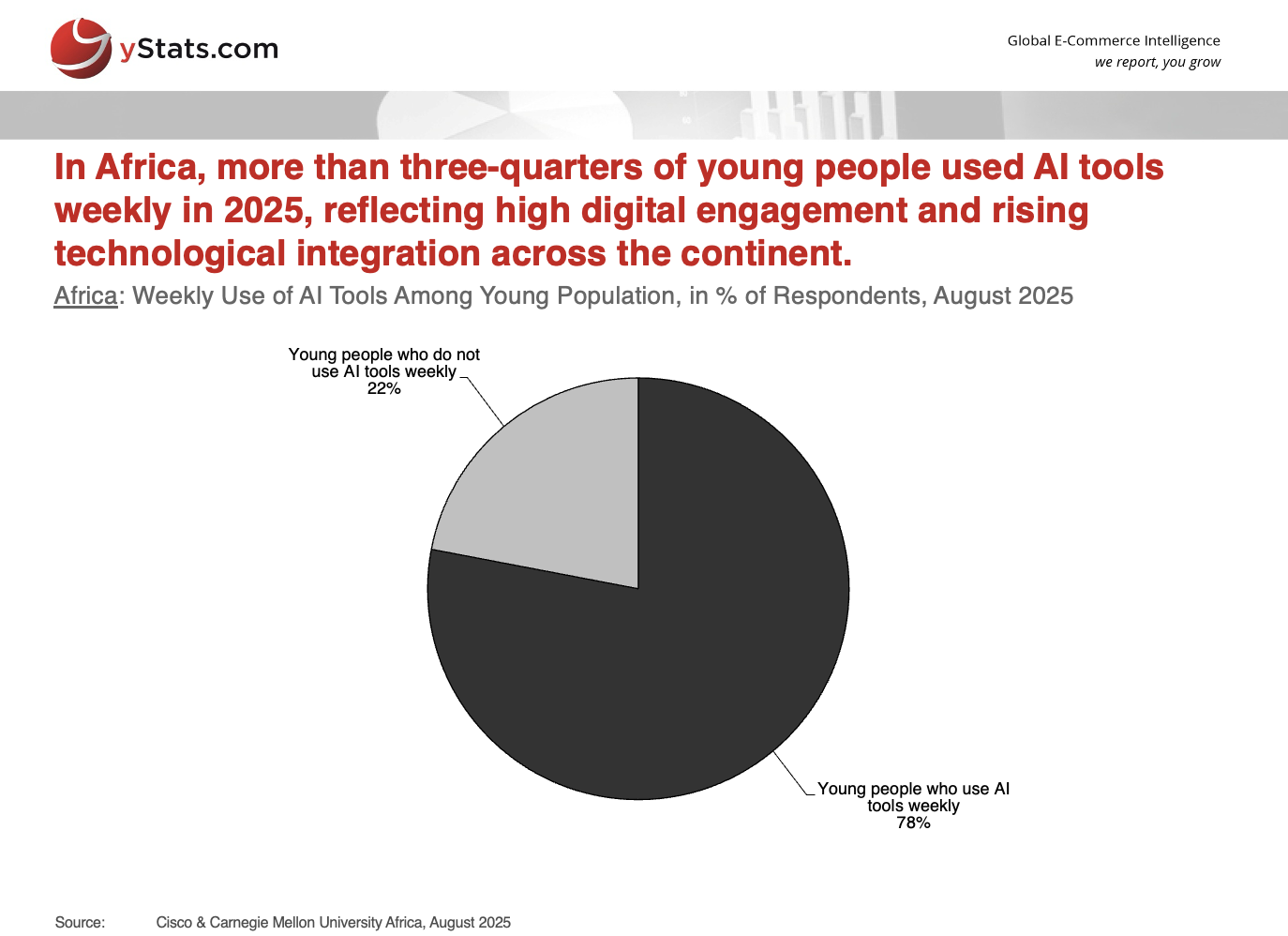AI Growth and Digital Transformation in Africa’s Payments and E-Commerce 2025

Financial Services Lead AI Integration Across the Region
The financial sector remains the primary driver of AI adoption across African markets. Banks, digital payment platforms, and mobile money operators are integrating AI-based fraud detection, risk scoring, chatbots, and identity verification systems to improve efficiency and expand access to financial services.
These applications are particularly significant in regions where credit bureau coverage is limited and where informal financial behavior is not captured in traditional risk assessment models. AI-supported alternative credit scoring has allowed institutions to serve unbanked populations more effectively, especially in markets such as Kenya, Nigeria, and Ghana.
Youth Demographics and Startup Ecosystems Drive AI Momentum
Africa’s population profile is a defining advantage in its digital transformation. Nearly three-quarters of the population will be under the age of 35 by 2030, creating a large base of digital-first consumers and innovators. In 2025, more than 75% of young Africans used AI tools weekly, according to Cisco & Carnegie Mellon University Africa, a signal of widespread technological readiness and cultural openness to digital experimentation. This rising engagement is supported by a growing network of regional innovation hubs, accelerators, and training programs. Countries such as Nigeria, Ghana, Rwanda, Kenya, Egypt, and South Africa are emerging as ecosystem leaders, with distinctive approaches tied to national priorities in fintech, agriculture, logistics, governance, and public services.
However, awareness and understanding of AI vary significantly across countries. In Egypt, for example, as per IPSOS, only around one-third of the population reported awareness of AI in 2024, and only a smaller share felt they understood it well enough to trust its use in daily life. In contrast, Nigeria and South Africa show higher levels of consumer familiarity and workplace integration, reflecting differences in digital literacy and public exposure to AI technologies.
AI Enhances Operations and Customer Experience in E-Commerce
AI is becoming increasingly embedded in E-Commerce operations across Africa. Retailers and digital platforms are deploying conversational AI assistants, personalized recommendation engines, automated customer service systems, and predictive stock management tools to improve user engagement and reduce operational costs. These enhancements align with broader shifts in consumer behavior, particularly among young, mobile-first shoppers who expect personalization and real-time interaction.
Yet the full value potential of AI in E-Commerce remains constrained by fragmented logistics networks, inconsistent data availability, and limited warehouse automation. Generative AI has the capacity to reshape product discovery, marketing content creation, and post-purchase support, but meaningful scaling requires greater investment in data infrastructure and supply chain digitization.
Sectoral Integration Highlights Multi-Sector Growth Opportunities
AI adoption is expanding across agriculture, healthcare, education, finance, energy, and public administration. These deployments reflect the continent’s development priorities, focusing on essential services and high-impact economic sectors. In 2024, nearly half of identified AI use cases across Africa were concentrated in agriculture, underscoring the sector’s importance for employment and food security. AI-driven crop monitoring, yield forecasting, and climate adaptation tools support both smallholder farmers and commercial agricultural networks, offering productivity and resilience benefits. Meanwhile, AI-supported diagnostics and telemedicine platforms are improving healthcare access in underserved regions, and educational platforms integrating AI tutoring and multilingual learning modules are helping address disparities in instructional quality and reach.
Scaling is Constrained by Infrastructure, Data, and Skills Gaps
Despite progress, structural challenges continue to limit widespread AI deployment. Data fragmentation remains a central obstacle. Many AI models deployed in Africa rely on datasets developed outside the continent, leading to gaps in contextual relevance and risks of algorithmic bias. Infrastructure limitations also restrict scaling. Data center capacity is heavily concentrated in South Africa, with smaller clusters in Egypt, Nigeria, Kenya, and Morocco, creating geographical imbalances in cloud access and computational resources. The AI talent pool remains limited relative to projected demand, with universities, training centers, and research institutions expanding capacity but struggling to match the skill requirements of industry.
Trust, Governance, and Regulation Will Determine the Pace of Scaling
Public trust in AI shapes adoption across Africa. Perceptions vary widely across countries. In Egypt, trust in AI fairness and data protection remains low, reflecting concerns about surveillance, job displacement, and lack of transparency. In contrast, in Nigeria and South Africa, a majority of respondents report trust and acceptance of AI systems, although both countries show strong support for regulatory oversight. In 2025, over 70% of Nigerians and over 65% of South Africans expressed support for developing national AI regulations, according to KPMG, signaling the importance of governance frameworks for public confidence.
National AI strategies and ethics guidelines are being developed across several markets, but many remain in early implementation phases. Aligning governance, investment, and public participation will be critical to ensuring that AI expansion is inclusive and socially sustainable.
Conclusion
AI adoption in Africa is accelerating, supported by demographic trends, sectoral innovation, and growing public-private collaboration. Payments and E-Commerce remain central to this trajectory, benefiting from AI’s ability to improve access, efficiency, and consumer engagement. Yet the full benefits of AI cannot be realized without addressing foundational gaps in infrastructure, data ecosystems, digital literacy, and workforce readiness. The next phase of Africa’s digital transformation will depend on how effectively countries can develop coordinated strategies that balance innovation, trust, equity, and economic development.



